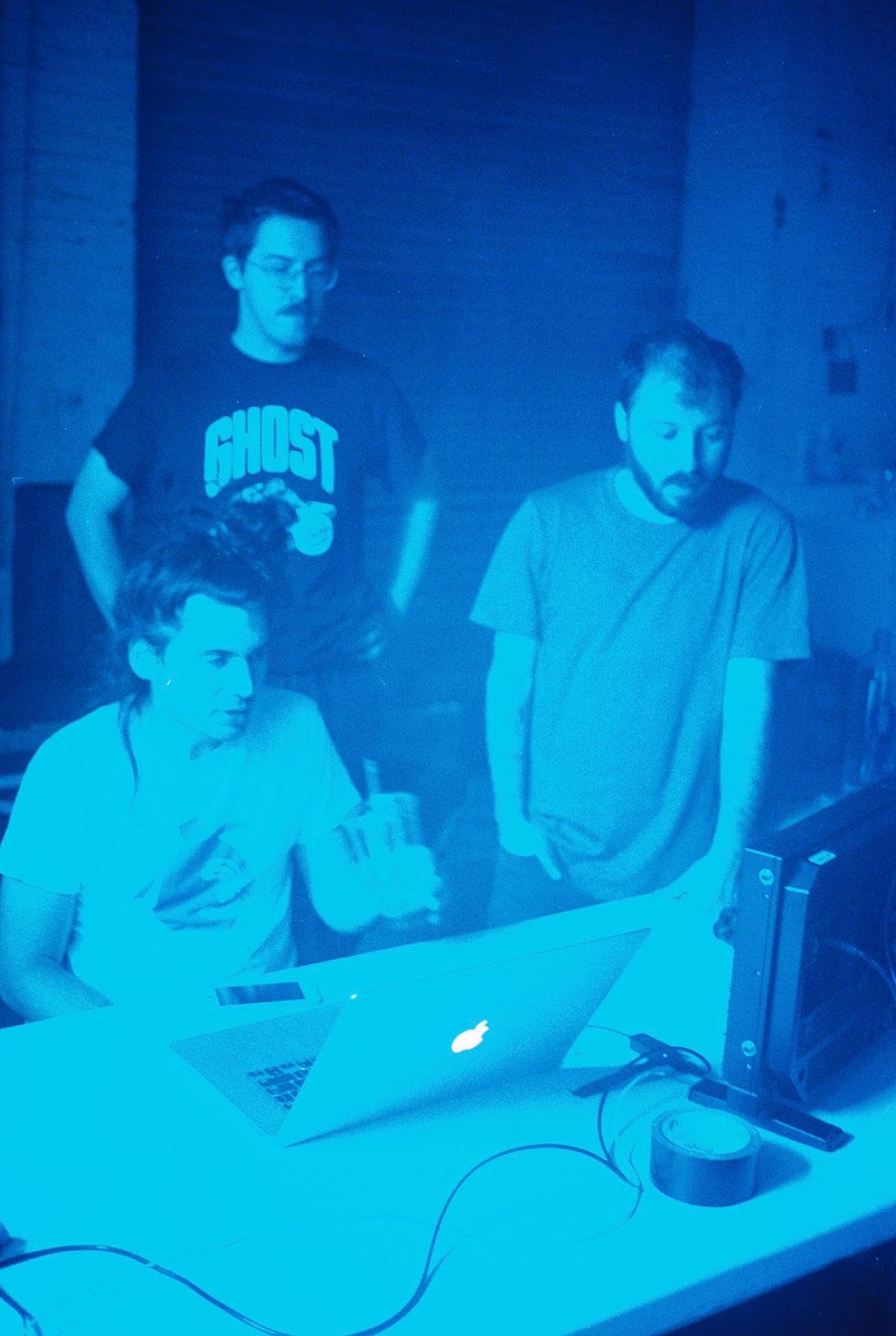Anamanaguchi took six years to create and release their sophomore album, [USA], released this month, but to fully understand why, you'd have to go back to before the chiptune rock band finished their debut studio album, Endless Fantasy. In 2013, Anamanaguchi was about to make the jump from relative obscurity to indie darling with an album that itself had already been four years in the making. There was incredible momentum behind Endless Fantasy, having been launched with the second most successful music-based Kickstarter project at the time. Anamanaguchi soon found themselves playing sold out crowds across the world, appearing on late night TV, and wondering where to go next.
Related | Meesh Wants to Be 'More Than Friends'
"With Endless Fantasy, we were really trying to make 22 custom virtual worlds," explains one of the band's lead guitarists and songwriters, Peter Berkman. "Having already scored video games before with the Scott Pilgrim [vs. the World: The Game] soundtrack and being interested in soundtracking for each of our musical lives independently of each other, we thought it was a really exciting task to give ourselves environments to score."

Clocking in at around 77 minutes, Berkman describes Endless Fantasy as an "indulgent" record, operating on a philosophy of "How do I wear this? How do I display this in public? How do I throw that next to something it normally wouldn't be thrown next to?" With a mix of energetic synths, churning guitars and blisteringly fast drums all swirling around one another, Endless Fantasy cycles through genres at a breakneck pace, flitting from light-hearted headbangers like "Meow" to sugar sweet sing-along anthems like "Prom Night" and sprawling lush instrumental odysseys such as "Space Wax America." It was the rare occasion where a maximalist approach to making an album actually worked, but that's not to say it didn't have its drawbacks. "There hit a point after we were sitting and tweaking these tracks, it was a bit OD for us," Berkman says. "This really is 'endless fantasy.'"
During this time, Berkman would come to be haunted by a documentary about the Japanese cannibal Issei Sagawa. Infamous for killing and then consuming the corpse of a woman he met in Paris, (and photographically documenting the process), Sagawa ended up walking free on a series of legal technicalities resulting from being declared mentally insane by French authorities and deported back to Japan. Unable to be retried in his home country, Sagawa became a cult figure in the porn industry, appearing in films that played up the dark sexual nature of his crime. In the case of Sagawa, a combination of "collective laziness, abdication of responsibility, [and] passing of the buck" bugged Berkman — a lack of justice being served in the face of atrocity that would sadly become a familiar norm in the years to come.
"The scene that struck me most in the documentary that was made was a scene from one of the pornography videos [where] the whole premise was that [Sagawa] would have sex with a girl, and they would just think he's a weird guy," Berkman recounts. In this particular film, the producers revealed Sagawa's notorious past to the actresses afterwards and interviewed them about the experience. "The response that haunted me, was one of the women said, 'I think it's selfish for him to let his fantasy grow so wild,' or something that like," Berkman says, acutely aware of the dark irony of having just wrapped up a project centered entirely on indulging fantasies at the time. "The simplicity of her statement and the accuracy was burning. I could not shake it, and it was around that time that we started getting more sensitive."

On a trip to Japan sometime after, Berkman came across a tweet that read somewhere along the lines of "I love Anamanaguchi's music. It sucks that they're white dudes." This was by no means the first time that the band had been brought up in discussions of appropriating Japanese culture; Soundcloud collective culture was at its peak and it wasn't uncommon to see a producer slap a random kanji on some cover art or a t-shirt simply for the aesthetic of it, but it did feel like the band was at a point of reckoning. "We had an immediate weird sense of a fucking mini-identity crisis, basically," Ary Warnaar, one of the band's other lead guitarists and songwriters, remembers. "We were living all this shit and these weird fantasy realms that we had invented and made up." They weren't entirely sure where things were going or needed to end up, but it was clear that the time had come for Anamanaguchi to leave fantasy behind.
Feeling somewhat deflated and lost, the band took a step back and really dove into the foundation of Anamanaguchi's identity. For Berkman, that involved getting to the heart of what his relationship to Japan was. "The obvious answer is video games," he says. Berkman realized that by growing up on a diet of video games he had in turn fostered a love of the culture that produced them. "Nintendo taught me how to read," he says. "My bedtime stories came from Japanese businessmen." The train of logic is easy enough to follow; Anamanaguchi is a band known for its use of chiptune, which is a genre that is defined by video game aesthetics that are in turn a byproduct of Japanese culture. Anamanaguchi would arguably not exist without Japan, but that didn't make them a Japanese band. Having been made aware of what the band was not, the task then became to define everything the band actually is.

"There are many identities imposed on you that feel completely arbitrary," Warnaar says. At this point, Warnaar and Berkman began to take a magnifying glass to the various descriptors that had been lobbed at the band. "I remember looking at fliers for shows and they list what countries the artist is from at the end of it. It felt sometimes borderline comical. What did it have to do with the music?"
Warnaar continues, "That's where the name came from, [USA]. Is it important or is it not important that you can put this tag on us? Is it interesting or is it not interesting? Why is it interesting or why is it not interesting?" To put it simply, what did it mean for Anamanaguchi to be considered an "American" band?

This was a loaded question, especially for a band that didn't initially view themselves as being directly part of a political conversation. The year was now 2014, the country was moving into the second term of the Obama presidency, Ferguson happened, and Tumblr was bought out by Yahoo. As all of this was going on, Berkman and Warnaar recalled a side-project they had started years before. This was in 2008 during the height of the Obama/McCain presidential campaign, when the band was asked to play a show in a vacant lot in what was then (mostly) pre-gentrified Bushwick. With half the band no longer based out of Brooklyn, Berkman and Warnaar suggested they DJ the event, realizing it would be a perfect opportunity to play music that would otherwise be too weird and goofy for the Anamanaguchi brand. As a sort of response to the jingoist fervor Berkman and Warnaar saw being whipped up on the news, they decided to call themselves Sweet America.
"We went to K-Mart [near Astor Place] and, if I remember the outfit correctly, we got jean shorts with a hammer loop, heather gray bass fishing shirts, identical, cut off the sleeves, American flag shutter shades," Berkman recalls. "We showed up to the show, and these were like serious DJs. [Brooklyn nightlife staple and former Fischspooner tour DJ] Lauren Flax was there, there was this DJ duo called Sweatshop Labor. We were all DJing off a tow-truck bed."
"A fucking era," Warnaar sighs as the two fondly reminisce about the music they got away with playing that night. "There was a Crystal Castles/Dragon Force/Coldplay mashup. That was the only mashup. The rest was all bad trance knockoffs."

Flash forward, back to 2014, and the creative freedom that Berkman and Warnaar found under the Sweet America name began to seem more and more enticing for a band in the throes of their own internal reckoning. While Anamanaguchi was never in any real danger of being killed off and replaced by Sweet America, at the time the band was getting to release the spring-loaded song "Pop It" and seriously debated whether or not to release it under their own name. "We were like, Maybe 'Pop It' is not an Anamanaguchi song. Maybe 'Pop It' is something entirely new," Berkman explains. "PC Music had just come out and we love so much about what they've done. Maybe we just have a new persona. Maybe that's the answer to our identity crisis."
In the end, Berkman and Warnaar realized that the lesson they learned from Sweet America was they were their most authentic when they threw caution to the wind and said, "Fuck it, let's go." They decided the more radical option was to release "Pop It" under the Anamanaguchi name and stand by it. "It was in that exact moment where we like, we're going to call the album [USA] in brackets," Berkman says, "because we've been working on all this music and if we had the attitude that we had when we were doing Sweet America, it will just be great. It will be what it is, and we won't overthink it, and it will be cool."
This felt like a breakthrough for the band; they had finally found a direction to go in and a place to throw all the music they had been working on over the past few years. They formally announced the album at the end of the music video for "Pop It," with a title card that read "[USA]: Coming 2015." But the year would come and go with the album nowhere to be found.
What did end up coming out was a mixtape disguised as a failed video game, Capsule Silence XXIV. "We thought it was [USA]," Berkman explains. "When we looked at the body of work, we were like, This doesn't answer the question that the title poses. This doesn't fulfill the emotional and personal weight that comes from the drama of that moment in Tokyo or sitting there in the engineering room, thinking about Sagawa." So instead of trashing the whole project, the band decided to release the material as a mixtape, enlisting Ben Esposito, a video game developer responsible for indie hits like Donut County, Tattletail, What Remains of Edith Finch, and Sonic Dreams Collection, to help create a semi-autobiographical video game as a vehicle to put it out into the world. The roll-out was chaotic with the band pretending to "leak" the game after issues with fictional developers and subsequently deleting all of their socials, but so was the world around them; before the year was out Trump would be president, or as Berkman puts it, "Vine got shut down."
Shortly thereafter, Anamanaguchi would get tapped to open for the North American leg of Japanese vocaloid pop hologram Hatsune Miku's tour. "Miku also helped me understand computer music a lot more and what separates it from electronic music," Berkman explains. "Computer music is programmatic. Nothing happens unless it's programmed. With electronic music, you're always relying on the quirks of the analog gear. You're always relying on the weirdness of the tuning, warmth of the tape." If you stripped away the pop star avatar elements to her mythos, Hatsune Miku is simply a synthesizer approximating a human voice. "It feels like an alphabet where there's only so many letters you can use," Warnaar adds. "It was a great pop star to work with, because we were just controlling what this is, it's not like capturing someone else's performance and borrowing from their ability."
After completing the tour, Anamanaguchi was feeling a lot better about who they were as a band. "We make music with computers because we live in a world with computers, and we've never lived differently than that," Berkman says. "Sampling is a great instance; there's no way to make a sample from nothing. The sample has to come from somewhere. So you can view the brackets around the [USA] thing as almost like sample." At long last this abstract quest for the band's identity had begun to materialize with [USA].
"This album is definitely about being never able to make our way back [to who we were before]," Warnaar explains. The world was a much different place from when they started down this path: Trump had ascended to power, Elon Musk and Grimes started dating, TikTok rose up to fill the void left by Vine. "[USA] has a journal vibe to it. Going through that whole experience it is about that transition from what the world was then and what it was to us, it's important to note, especially since the album is called [USA], it certainly is not about the United States of America."

At its core, [USA] is about trying to make sense of a world, picking apart language until it is unrecognizable, stripping away meaning until all you have left is raw abstract emotion. Perhaps the best example of this is the lead single, "Lorem Ipsum," which borrows its lyrics from the common placeholder text used in graphic design. Berkman points out that they include the "quia" from the original Cicero text, but the effect still remains the same. You aren't supposed to listen to the words, or translate the dead language in your head, but instead intuit the meaning from the way those words are delivered as they're carried in on cinematic drum swells and dazzling guitar melodies.
The album's second single, "Air On Line," takes this concept a step further by chopping up bits of audio Berkman found in an online video game developer library to create a string of stuttered syllables for the song's hook. The song is unabashedly anthemic, lending itself well to festival-sized crowds waving their hands back and forth, confused as they try to sing-along. Warnaar describes this sensation as being similar to the comfort you get from singing the national anthem. You end up knowing the lyrics so well that you reach a point where you're no longer thinking about what you are singing; through repetition, the song hollows out its own meaning.
[USA] is a coming of age album for Anamanaguchi. "Without being too depressing, the truth is that you feel more things the older you get," Warnaar says. "When people ask why it was so sugar-coated before, it's because things were more sugar-coated. We've grown up and I've gone through a lot more shit. I wasn't losing friends that were dying when I was younger. I am now."
Given the scale and scope of [USA], it would be hard to distill the album down to just one idea. It's about being lost and finding yourself, trying to make sense of the world and then actively resisting that impulse; [USA] is not about the United States of America and at the same time unavoidably about it. In the same way that art does not exist in a vacuum, [USA] is a product of its times, a sobered response to the chaos that surrounds us and how we try to find our place within it. There is no easy answer and [USA] is not about providing one; it's an album about getting there, understanding you'll never be who you once were, and finding out a way to be okay with that.
Anamanaguchi's new album, [USA], is out October 25th on Polyvinyl Records.
Photography: Leia Jospe
![The Long Road to Anamanaguchi's '[USA]'](https://www.papermag.com/media-library/image.jpg?id=22021768&width=1800&height=900&quality=70&coordinates=0%2C0%2C0%2C342)